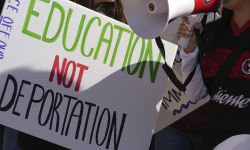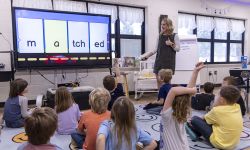Detroit schools will reopen in the fall even if the Legislature takes action

The Detroit Public Schools Community District shared its fall reopening plans at a school board meeting last week amid much protest and discussion of whether it is safe for students and teachers to return, in-person, to the classroom. In response to the coronavirus pandemic, an E-Learning package is now moving through the Legislature that would adjust state-mandated count days and in-seat time to include online learning this fall.
Due to current state laws, Detroit, like other public school districts, must provide at least 1,098 instructional hours and 180 days of in-seat learning.
The House’s e-learning package would allow the Department of Education to develop a plan for the number of eligible e-learning days. That includes changes to the number of required in-person instruction days when circumstances outside of school administrators’ control, like a pandemic, fires, or severe flooding, force schools to close. If the package fails, even districts that have already announced online learning this fall, will be required to count students in the classroom on Oct. 7 to receive state aid.
This is troubling for districts like Detroit, which has struggled with chronic absenteeism. Enrollment on count day determines 90 percent of state funding for a Michigan school district. The enrollment tally is critical to the financial health of the Detroit district, which has struggled to stabilize its financial health over recent years.
The DPSCD school board approved a school reopening plan last week that includes online and face-to-face instruction as an option for students, but community members say it’s too soon to bring anyone back into the classroom — especially teachers. If changes aren’t made at the state level, students who can afford to move to private schools with online education may leave, and teachers who don’t want to risk their health may have to choose between their life or their job.
Protests over face-to-face summer school instruction began last week as students started summer school. Activists and community members contend the district doesn’t have proper protocols to support educators during the coronavirus pandemic.
The group, led by By Any Means Necessary, filed a lawsuit last week against superintendent Nikolai Vitti, Detroit Mayor Mike Duggan and Gov. Gretchen Whitmer. The governor created a task force to determine the state criteria for schools reopening in the fall, which includes a list of safety requirements and recommendations depending on individual district needs.
Now, the debate over reopening schools has escalated and become a politicized issue. U.S. Secretary of Education, Betsy DeVos, is threatening to withhold federal dollars from public districts that do not offer face-to-face learning this fall.
State Superintendent Michael Rice says DeVos has no authority to withhold funds on the basis that she disagrees with districts that are allowing online learning.
Bob McCann, executive director of Tri-County Alliance for Public Education, said he hoped the proposed bills would have provided more clarity on school budgets. Tri-County Alliance is a coalition of K-12 educators across the state. McCann said the e-learning bill package does not clarify state count requirements for funding and is ‘overly prescriptive’ in some areas, like having kindergarten through fifth-grade students return to the classroom and demanding standardized testing for students within 30 days of the first day of school.
“Every superintendent in the state right now is throwing up their hands saying ‘I don’t know how to plan for school right now’,” McCann said.
Related: Detroit schools propose fall reopening plans amid concerns, protests and politics
The executive director said it was disappointing to see the Legislature demand any in-person learning with so many parents and educators concerned about their safety. It’s unclear how many students DPSCD can afford to opt into online learning this fall under the state’s current school aid laws or under the proposed e-learning package.
“That is the million-dollar question,” Vitti wrote in an email to BridgeDetroit. “We have not received any funding information regarding how public school districts will, or if they will, receive funding for virtual options from the state or the federal government.”
“That is the million-dollar question…we have not received any funding information regarding how public school districts will, or if they will, receive funding for virtual options from the state or the federal government.” — Dr. Nikolai Vitti, DPSCD superintendent
Detroit residents’ lack of broadband access created barriers to education and health services during the coronavirus pandemic this spring. However, Vitti announced in a social media post this week that every DPSCD student, returning or newly enrolled, will be given a laptop computer and internet access this school year.
DPSCD reopened last week to offer face-to-face and online summer school. Vitti said the reopening was a reaction to parent requests who said their children were falling behind. There were 500 students in face-to-face instruction last week with 420 online.
“We needed 170 teachers to do it and 300 said they would,” Vitti said.
Vitti told BridgeDetroit that DPSCD’s reopening plan is intentionally rigorous in coronavirus safety strategies.
DPSCD will receive $80 million over two years to prevent the spread of coronavirus through the Coronavirus Aid Relief and Economic Security Act. These dollars will be used for PPE, temperature check machines, contract social workers, internet access for students, and to hire additional teachers to reduce class sizes if needed.
Classrooms will be cleaned at the end of each day with a checklist of requirements before students can enter again the following day. The superintendent said the district will set up an anonymous hotline for educators to use to critique cleaning procedures.
“We’re well-positioned to implement the state taskforce recommendations,” Vitti said. “If the state budget is not cut past 10 percent, if it goes much deeper than that, 20 percent or more, then we would have to use CARES Act funding to fill the gap.”
But some say that’s not enough to prevent the spread of coronavirus. Callers flooded the public comment portion of the district’s school board meeting last week to share their disapproval of the reopening plan and asking that public health officials be included in the decision-making process.
Iris Taylor, president of the school board, called the public comment period of the last board meeting a “catastrophe,” and that the district should share a public apology.
Taylor was talking about the technical difficulties that prevented many from joining the virtual meeting or from being heard during public comment. Ironic, as the school board began the meeting by applauding themselves for their transparency during the coronavirus pandemic, followed by community members’ hostile reactions to the board-approved reopening plan. Some even questioned why the board was holding a virtual meeting but allowed students and teachers back in school buildings.
The proposed bills were sent to the Education Committee last week for a legislative analysis. While the bills do not amend the State School Aid Act, they provide exemptions to allow e-learning days to qualify as in-person instruction days. The bills also consider the additional costs of virtual learning that would allow students to participate across economic thresholds.
BridgeDetroit reached out to Rep. Tyrone Carter of District 6 who also sits on the Education Committee, but Carter did not respond.
Vitti said now is the time to reimagine what school looks like. The superintendent said he “completely understands” why some parents may want their children to stay at home and that the district would allow options for families as long as the district met state requirements.
“One thing we all have to do is take a step back and actually listen to parents,” Vitti said. “Most of the protesters are not DPSCD parents, And so I think protesters have legitimate concerns that I never dismissed, but I don’t think the average protester has DPSCD children that need to be educated and I think that is a different reality.”
Michigan Education Watch
Michigan Education Watch is made possible by generous financial support from:
Subscribe to Michigan Education Watch
See what new members are saying about why they donated to Bridge Michigan:
- “In order for this information to be accurate and unbiased it must be underwritten by its readers, not by special interests.” - Larry S.
- “Not many other media sources report on the topics Bridge does.” - Susan B.
- “Your journalism is outstanding and rare these days.” - Mark S.
If you want to ensure the future of nonpartisan, nonprofit Michigan journalism, please become a member today. You, too, will be asked why you donated and maybe we'll feature your quote next time!






